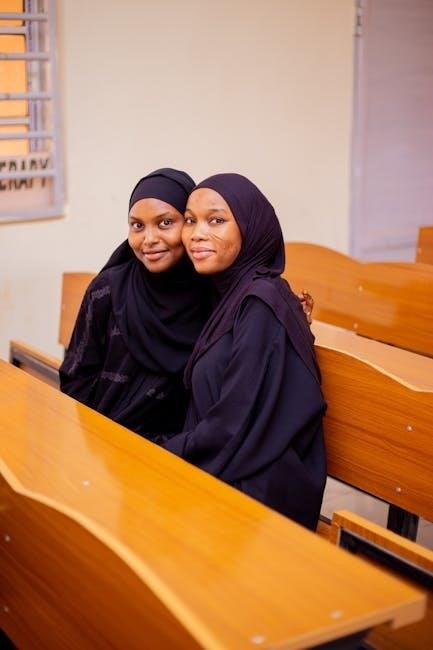gholdy muhammad 5 pursuits pdf
Dr. Gholdy Muhammad, a renowned educator, developed the 5 Pursuits framework to promote equity in education. Her model emphasizes identity, skills, intellectualism, criticality, and joy, fostering holistic learning environments. The Gholdy Muhammad 5 Pursuits PDF offers a comprehensive guide for educators to implement these principles effectively, ensuring culturally responsive teaching practices.
Overview of Dr. Gholdy Muhammad’s Work
Dr. Gholdy Muhammad is a prominent scholar and educator known for her work in culturally responsive and equity-focused education. Her framework, the 5 Pursuits, emphasizes identity, skills, intellectualism, criticality, and joy as essential components of learning. Author of Cultivating Genius, she advocates for teaching practices that honor students’ backgrounds and foster critical engagement. Her work bridges literacy development with social justice, ensuring education is inclusive and transformative. Dr. Muhammad’s HILL Model and 5 Pursuits have become cornerstone frameworks for educators seeking to create equitable learning environments. Her contributions have significantly influenced modern education, empowering teachers to address diverse student needs effectively.
The Concept of the 5 Pursuits in Education
The 5 Pursuits, developed by Dr. Gholdy Muhammad, form a transformative framework for education, focusing on identity, skills, intellectualism, criticality, and joy. These interconnected elements aim to create holistic learning environments that honor students’ backgrounds and foster equity. Identity encourages self-awareness and cultural pride, while skills develop essential competencies. Intellectualism promotes critical thinking, and criticality engages students in analytical reflection. Joy, the newest addition, emphasizes positive learning experiences. Together, these pursuits ensure education is inclusive, empowering students to thrive academically and socially. The framework is designed to be adaptable, providing educators with a guide to cultivate genius and ensure all students succeed.

The Five Pursuits Explained
Dr. Gholdy Muhammad’s 5 Pursuits—identity, skills, intellectualism, criticality, and joy—offer a transformative framework for education, balancing academic rigor with personal growth and cultural relevance.
Identity: Understanding Student Identities
Dr. Gholdy Muhammad’s first pursuit, Identity, focuses on understanding and valuing students’ cultural, social, and personal backgrounds. This pursuit emphasizes how teachers can help students explore and reflect on their identities, fostering self-awareness and confidence. By integrating students’ lived experiences into the curriculum, educators create inclusive environments where learners feel seen and respected. Identity is foundational, as it shapes how students engage with content and interact with peers. Muhammad advocates for practices that celebrate diverse perspectives, ensuring students develop a positive sense of self while connecting their identities to academic learning. This pursuit is critical for equity and culturally responsive education.
Skills: Developing Essential Competencies
The second pursuit, Skills, focuses on building students’ essential competencies across various academic disciplines. Dr. Muhammad emphasizes the importance of equipping students with tangible skills that prepare them for future challenges. This includes critical thinking, problem-solving, and communication, all of which are vital for academic and lifelong success. By aligning instruction with clear learning objectives, educators ensure students develop these skills progressively. Muhammad’s framework encourages teachers to assess and track skill development systematically, providing targeted support to meet individual student needs. This pursuit ensures that students gain the tools necessary to excel in an ever-evolving world, fostering both academic rigor and practical application.

Intellectualism: Fostering Critical Thinking
Intellectualism, the third pursuit, focuses on fostering critical thinking and deep engagement with academic content. Dr. Muhammad emphasizes the importance of encouraging students to think analytically and explore complex ideas. This pursuit promotes a culture of intellectual curiosity, where students are empowered to question, reflect, and develop informed perspectives. By integrating rigorous academic practices with culturally responsive strategies, educators help students build a strong foundation for lifelong learning. Intellectualism is not just about academic achievement but also about nurturing minds that can engage thoughtfully with the world, fostering a sense of agency and intellectual confidence in all learners.
Criticality: Encouraging Analytical Engagement
Criticality, the fourth pursuit, emphasizes the development of analytical engagement and the ability to critique and evaluate information. Dr. Muhammad advocates for teaching students to think deeply and question assumptions, fostering a mindset of intellectual curiosity and discernment. This pursuit encourages educators to design learning experiences that prompt students to analyze texts, ideas, and societal structures critically. By fostering criticality, students gain the tools to navigate complex information, challenge biases, and develop well-supported arguments. This pursuit is essential for preparing students to engage thoughtfully with the world, fostering a deeper understanding of content and their role within it.
Joy: Cultivating Positive Learning Experiences
Joy, the fifth pursuit, focuses on creating positive and engaging learning environments. Dr. Muhammad emphasizes the importance of fostering a sense of enjoyment and connection in education, ensuring that students feel valued and motivated. This pursuit encourages educators to incorporate activities that spark curiosity and creativity, making learning both meaningful and enjoyable. By prioritizing joy, teachers can help students develop a lifelong love for learning and a positive association with academic growth. This approach also supports social-emotional well-being, creating a nurturing space where students thrive academically and personally, aligning with culturally responsive practices that celebrate student identities and experiences.
Equity and Culturally Responsive Teaching

Dr. Gholdy Muhammad’s work emphasizes equity and culturally responsive practices, ensuring all students receive inclusive, high-quality education. Her framework supports educators in creating environments where diversity is celebrated and valued, fostering academic success and social growth for all learners.
The Role of Equity in Modern Education
Equity in modern education ensures that every student receives fair opportunities to succeed, regardless of their background. Dr. Gholdy Muhammad’s 5 Pursuits framework highlights the importance of addressing systemic inequalities by creating tailored learning experiences. This approach emphasizes recognizing and valuing students’ diverse identities, skills, and intellectual capabilities. By integrating equity into teaching practices, educators can foster inclusive classrooms where all students feel empowered to grow academically and socially. The framework also encourages critical thinking and joy in learning, ensuring that education is both transformative and culturally responsive. Equity is not just a goal but a foundational principle in Dr. Muhammad’s model, aiming to dismantle barriers and promote student success.
How the 5 Pursuits Align with Culturally Responsive Practices
Dr. Gholdy Muhammad’s 5 Pursuits—identity, skills, intellectualism, criticality, and joy—align seamlessly with culturally responsive practices by prioritizing students’ cultural and historical contexts. The framework encourages educators to recognize and honor students’ identities, fostering a sense of belonging. By integrating diverse texts and experiences, it promotes intellectualism and criticality, enabling students to engage deeply with their learning. The inclusion of joy ensures that education is not only rigorous but also meaningful and engaging. This alignment creates inclusive classrooms where students’ backgrounds are celebrated, and their potential is maximized, reflecting the core principles of culturally responsive education.
Implementation in Educational Settings
Educators integrate the 5 Pursuits by aligning lessons with identity, skills, intellectualism, criticality, and joy, using competency-based education to address these areas and track student growth.
Strategies for Integrating the 5 Pursuits in Classrooms
Teachers can integrate the 5 Pursuits by designing lessons that align with identity, skills, intellectualism, criticality, and joy. Start with project-based learning to connect students’ identities to academic content. Use culturally responsive texts to foster intellectualism and criticality. Encourage reflective practices to develop skills and joy in learning. Teachers should also model critical thinking and provide opportunities for students to engage in meaningful discussions. Formative assessments can track progress in each pursuit, ensuring equitable growth. By embedding these strategies, educators create inclusive and transformative learning experiences that honor students’ diverse backgrounds and promote academic excellence, as outlined in the Gholdy Muhammad 5 Pursuits PDF.
Case Studies and Examples of Successful Implementation
Case studies demonstrate the effectiveness of the 5 Pursuits in real classrooms. For instance, a middle school Social Studies class used project-based learning to integrate identity and intellectualism, resulting in deeper student engagement. High school educators incorporated criticality by facilitating discussions on historical justice, fostering analytical thinking. These examples align with Dr. Gholdy Muhammad’s framework, as detailed in the Gholdy Muhammad 5 Pursuits PDF. Successful implementation often involves culturally responsive practices, such as using diverse texts and encouraging student voice. Such strategies have led to improved academic outcomes and a more inclusive learning environment, showcasing the transformative potential of the 5 Pursuits in education.

Impact on Student Outcomes
The 5 Pursuits enhance academic growth, empowering students to embrace their identities and develop critical thinking. They foster joy, equity, and lifelong learning in education.
How the 5 Pursuits Transform Student Learning
The 5 Pursuits revolutionize education by integrating identity, skills, intellectualism, criticality, and joy into learning. They empower students to connect with their heritage, develop essential competencies, and engage critically with content. By fostering a love for learning and promoting equity, the framework ensures that students become active participants in their educational journey. This transformative approach not only enhances academic achievement but also cultivates socially conscious and emotionally intelligent individuals. The Gholdy Muhammad 5 Pursuits PDF provides educators with practical strategies to implement this model, leading to more inclusive and impactful classrooms.
Empowering Students Through Culturally Responsive Education
Culturally responsive education, as outlined in the Gholdy Muhammad 5 Pursuits PDF, empowers students by valuing their identities and backgrounds. This approach ensures that learning is inclusive and relevant, fostering a sense of belonging. By integrating students’ cultures into the curriculum, educators create environments where diverse perspectives are celebrated. The framework encourages critical thinking and intellectual growth, enabling students to navigate societal complexities with confidence. Ultimately, culturally responsive education equips students with the tools to succeed academically and socially, preparing them to thrive in an ever-changing world.
Dr. Gholdy Muhammad’s 5 Pursuits framework revolutionizes education by emphasizing equity and cultural responsiveness. Its future implications promise transformative learning experiences, fostering inclusive and empowered educational environments globally.
Summarizing the Significance of the 5 Pursuits
Dr. Gholdy Muhammad’s 5 Pursuits—Identity, Skills, Intellectualism, Criticality, and Joy—offer a transformative framework for education. By addressing students’ cultural identities and fostering essential competencies, this model ensures equitable learning opportunities. It encourages critical thinking and analytical engagement while promoting positive educational experiences. The integration of these pursuits not only enhances academic outcomes but also empowers students to become socially conscious and active participants in their communities. The Gholdy Muhammad 5 Pursuits PDF provides educators with practical strategies to implement this framework, making it a vital resource for creating inclusive and impactful learning environments.

Future Directions for Culturally Responsive Education
The 5 Pursuits framework by Dr. Gholdy Muhammad offers a roadmap for advancing culturally responsive education. Future efforts should focus on integrating these pursuits into teacher training programs and curriculum design. Schools can adopt innovative strategies to embed identity, skills, intellectualism, criticality, and joy into daily instruction. Expanding the framework to early childhood education and higher education settings will ensure continuity and equity. Additionally, leveraging technology to create interactive resources, like the Gholdy Muhammad 5 Pursuits PDF, can broaden accessibility; By prioritizing culturally responsive practices, educators can foster inclusive learning environments that empower all students to thrive academically and socially.

Accessing the ‘Gholdy Muhammad 5 Pursuits PDF’
The Gholdy Muhammad 5 Pursuits PDF is available through educational platforms and her official publications. It provides detailed insights into her framework for equitable learning.
Where to Find the PDF and Additional Resources
The Gholdy Muhammad 5 Pursuits PDF can be accessed through various educational websites, including Scholastic Inc. and Seattle University’s College of Education resources. Additionally, her book Cultivating Genius and related materials are available on platforms like Amazon and Google Books. Educators can also explore her presentations and workshops hosted by institutions like Glenbard Parent Series and Aurora Institute. These resources provide practical strategies for integrating the 5 Pursuits into classroom practices, ensuring equitable and culturally responsive education. Utilizing these materials helps educators align their teaching methods with Dr. Muhammad’s innovative framework.
Benefits of Using the PDF for Educators
The Gholdy Muhammad 5 Pursuits PDF offers educators a clear framework for implementing culturally responsive teaching. It provides practical strategies for integrating identity, skills, intellectualism, criticality, and joy into lesson plans. The PDF serves as a valuable resource for professional development, helping teachers create inclusive learning environments. By using this guide, educators can enhance student engagement, foster critical thinking, and promote equity in the classroom. The PDF’s accessibility ensures that educators worldwide can benefit from Dr. Muhammad’s expertise, making it an essential tool for modern educational practices aimed at empowering all students to thrive academically and socially.

